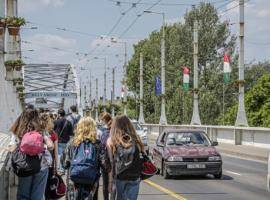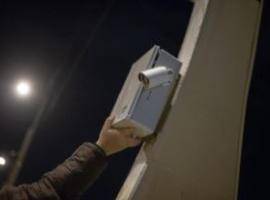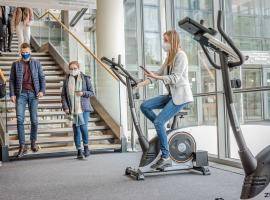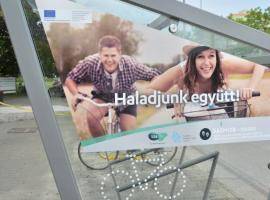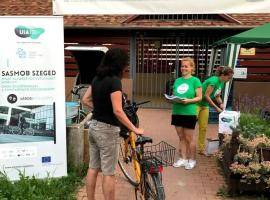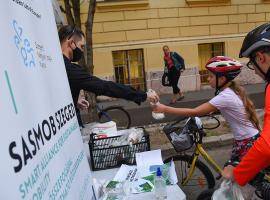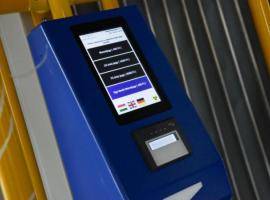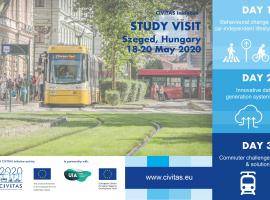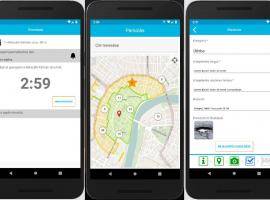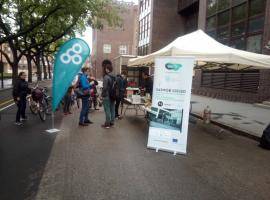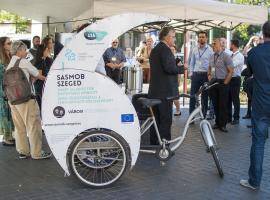If Something Has Worked, It Should Be Passed on: SASMob Best Practices for Everyone!
The brochure summarises the already implemented ideas in 12 points, trusting that further employers in Szeged will be open to and join the implementation of sustainable transport projects.
The 12 points – briefly:
1. Traffic counting using smart devices
One of the aims was to make transport organisation in Szeged easier; today, up-to-date traffic data are available for this. An automatic passenger and traffic counting system has been installed, which uses the technology patented by the Software Development Department of the Faculty of Sciences and Information Technology of Szeged University.
2. Smart City Data Centre (“SCDC”) (“Okos Város Adatközpont”; “OVAK”)
The aim was to make the operation of the city more transparent. The solution was the trial version of the Smart City Data Centre, operated by Ritek Zrt., which connects different types of databases: temperature measurements, the commuting habits of employees, parking and traffic data. It was owing to the availability of the information offered by the system that, for example, Griffsoft Informatikai Zrt. could make and offer certain developments.
3. Bike shelter capacity enlargement at employer sites
One of the key aims of the project was to promote sustainable means of transport, involving seven large employers in Szeged. To promote the use of bicycles as a sustainable and climate friendly means of transport, infrastructure development projects were needed – this is how a total of 400 bike shelter parking places were installed at these seven companies.
4. Company bikes and e-scooters to rent
For the purpose described above, Evosoft Hungary Kft., Szegedi Környezetgazdálkodási Nonprofit Kft. and Deutsche Telekom IT Solutions purchased, in the framework of the project, bikes and electric scooters that are available for rent, thus motivating employees to use these vehicles.
5. Bicycle service point establishment
To make travelling by bike easier, three companies (Evosoft Hungary Kft., Pick Szeged Zrt. and Deutsche Telekom IT Solutions) established bike service points at their premises so their employees can repair or order the repair of their own or rented bicycles locally.
6. Campaign to promote travelling by bike
The campaign that promoted travelling by bicycle continued to be one of the programmes promoting sustainable means of transport. The programme was implemented at all the seven employers, though in different ways. One of the most popular ways was participation in the national Bike To Work! (“Bringázz a Munkába!”; BAM) campaign. Some companies focused on the topic at a health or sports day event, others distributed mini maps to implement the goal.
7. Children’s drawing campaign
The other important means of sustainable transport to be promoted is community transport. Efforts to this end include the children’s drawing campaign announced by six employers/project partners for their employees’ children of all ages under the title “Community transport in Szeged now and in the future – how do you see and/or imagine transport in the city in 20, 50 or 100 years?”. The drawings were put on display on trams, trolleybuses and buses, together with the name of the artist.
8-9. Ticket and season ticket vending machines at workplaces & Wall map presenting community transport opportunities
Szent-Györgyi Albert Clinics Centre of Szeged University (“SZAKK”) and Pick Szeged Zrt. installed ticket and season ticket vending machines at their premises. Besides, wall maps presenting community transport opportunities were also put on display at these organisations, to help commuters find the best way to get to work.
10. Sustainable mobility management – university course
As the name also suggests, this project could be implemented by the Faculty of Economics of Szeged University. From now on, the course will be announced in every semester, and will be available to both university students and professionals, thus promoting networking.
11. Research into the impacts of the COVID-19 pandemic on workplaces
An unplanned by-product of the project was this research, which analysed the impacts of the lockdowns ordered in the spring of 2020. The research includes the results of both a questionnaire (online) interview and focus group discussions. The research questions also covered the impacts of homeworking on travelling and employee well-being. The results can be read in the brochure that presents good practices and on this link (in English).
12. Traffic light phasing to promote community transport
As the traffic lights in Szeged were not always phased to match the needs of community transport, the municipal government surveyed the locations where modifications were needed and, including the transportation companies in the work, fine-tuning is planned at 18 locations.
Source: Mobilissimus.hu & Szeged.hu
https://mobilissimus.hu/hirek/sasmob-szeged-jogyakorlatok-fenntarthato-kozlekedes-nepszerusiteseert

